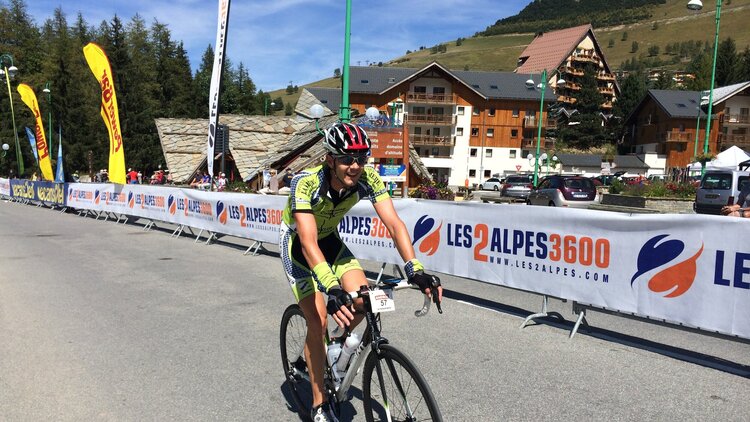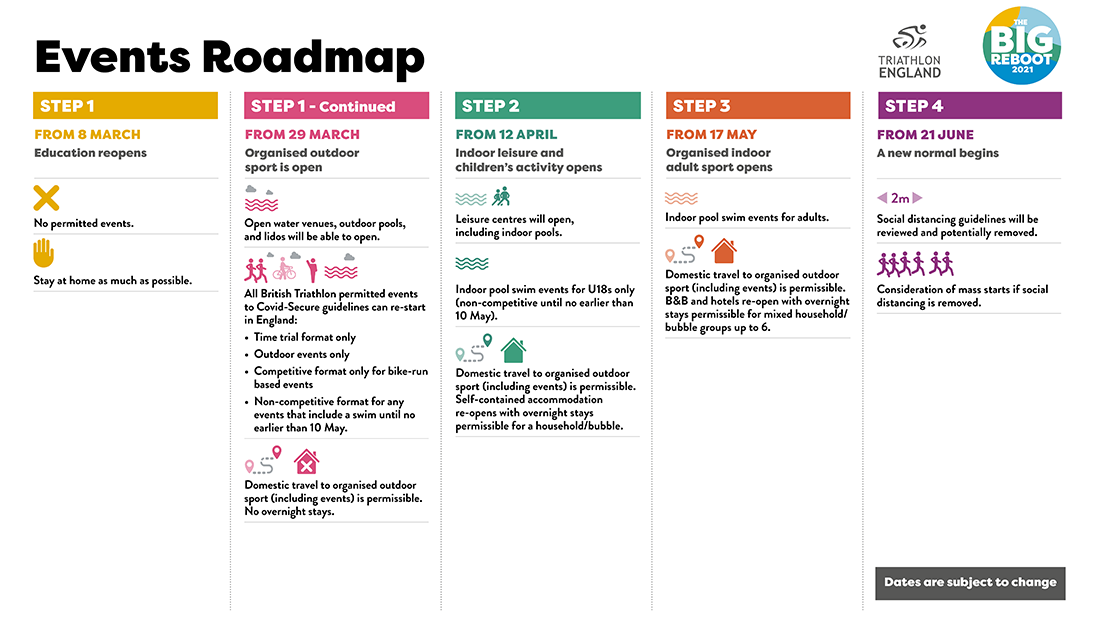How to return to the swimming pool after lockdown?
As we are provided with a roadmap to when pools and events will open up in the UK, Coach Kevin gives us clear instructions on preparing for the return to swim training in the pools after what has been a long time out of water.
British Triathlon has an up-to-date roadmap for events and training. Check it out here for current information.
As the above graphic indicates, the plan is to open indoor swimming pools to the public in England from the 12th of April. There will be five weeks of ‘individual activity’ before group sessions are then possible, where you can have the luxury of someone else telling you what to do from the poolside. Timings may be different in Scotland, Northern Ireland & Wales (and of course in the rest of the world!)
So if pools are opening up for you in the not so distant future, what do you need to consider before dipping your toe(s) back into the water?
The first thing to keep in mind will be just how long it’s been since you last swam! For some of us, this could be a very long time, and we need to be realistic with our expectations as we get back into the pool. Whilst hopefully none of us will sink like a stone to the bottom, all those previously ingrained movements will be very rusty, as you have not likely reinforced any of those nerve pathways and muscle firing patterns in a long while. Those of you who were doing dryland work to replicate those swimming movements will have a good head start, but it’s still not ‘real swimming’, to a much greater degree than Zwift is not ‘real cycling’. Swimming is a complex multidimensional movement pattern involving your whole body, outside of your typical environment, in a horizontal position. There are no bike frames or cranks to ensure your movements will be precisely the same as the last time you tried it. If you didn’t manage to get round to any dryland work, now would be an excellent time to start to build back a little of that mobility and maybe even some strength.
Some of you will love swimming for its technical complexity, but this same complexity means that we’ll need to go easy on ourselves from the start and not dive in expecting to bang out one of your previously manageable tough sessions.
Of course, it depends on your level of experience before lockdown/pools being closed. Still, it’s probably safe to say that for most of us, the first few times back in the pool should mainly be about familiarising yourself with being in the water again, rather than worrying about hitting certain times or X number of reps.
Once you’ve got a feel for things back a little, and you do start into some sort of structure, then be aware that it’s pretty natural to have expectations of what you are capable of based on your previously remembered level at swimming. Your mind may be willing, but your body might well disagree, so be prepared for it to make this known! Coach Alan will follow up with another article that will give suggestions of appropriate session plans to help you through your first week of structured swimming.
Instead of just rocking up to your leisure centre with your swim bag “old school” style, you’ll need to do a little bit of homework around how your local pool is going to be operating. Expect to have to book a time slot, and given the level of possible demand when the pool first opens, it might be worth finding out how early you will be able to make that booking. If that booking process allows, then more frequent, short sessions would be a better place to start than fewer sessions and expecting to get a lot of work done. Even if the scheduled slots are long enough to do this, your body may have other ideas!
There will likely be limits on numbers, so you shouldn’t have to worry about it being overly busy if you manage to get one of those early spaces. However, if this type of organisation is new to your local pool, then there could well be teething problems, so go with an open mind, follow instructions and be flexible. At the end of the day, time in the water is the primary goal, so take whatever you can get!

Kevin opened a B&B for cyclists in France in 2014, & then a year later decided to start a cycle coaching (level 3) qualification. This was mainly in order to be able to better support his guests (but also to make his own training more effective too). At the B&B he runs the odd training camp for cyclists but mainly offers coaching advice while guiding guests. An engineer by background, he happy diving into all sorts of training data, but also understanding that coaching is about much more than just the numbers!
After being introduced to triathlon by a good friend & then taking part in races for a couple of years he decided that a level 2 coaching course with British Triathlon was the way forward, completing this in 2019.
Visit Kevin's
Coach profile
We’re here to help
Tri Training Harder are one of the leading Triathlon coaching providers in the UK, using our wealth of experience to unite scientific and technological research with already well-established and successful best practices, to create a formula for triathlon and endurance coaching that works.
The result is an honest, dynamic, yet simple new way of constructing an athlete’s training to allow them to reach their potential.
If you’re planning your next season, just starting out in the sport or are looking for extra guidance at the very top end of the field, we are here to help, and our coaches would be delighted to hear from you. You can contact us via the website, and one of the team will be in touch.

